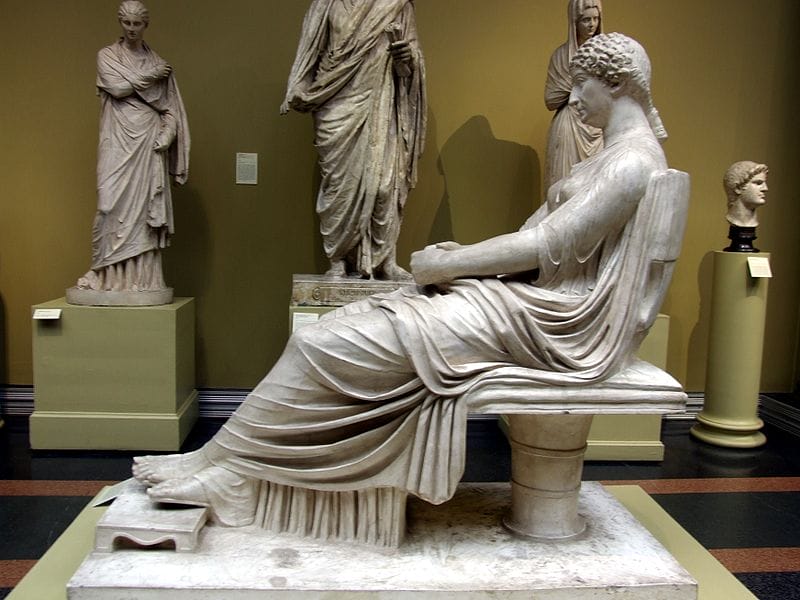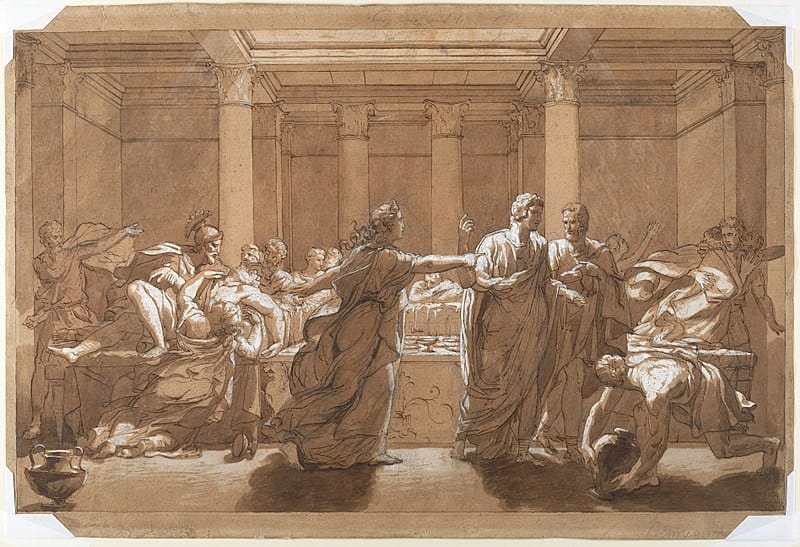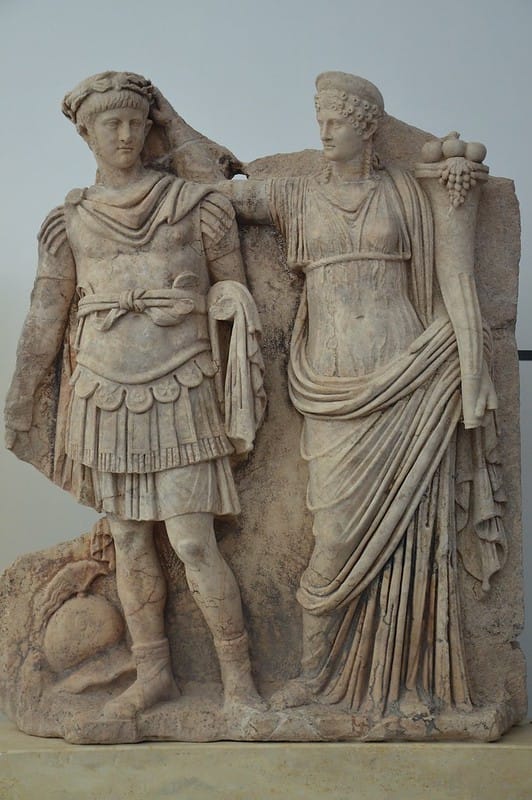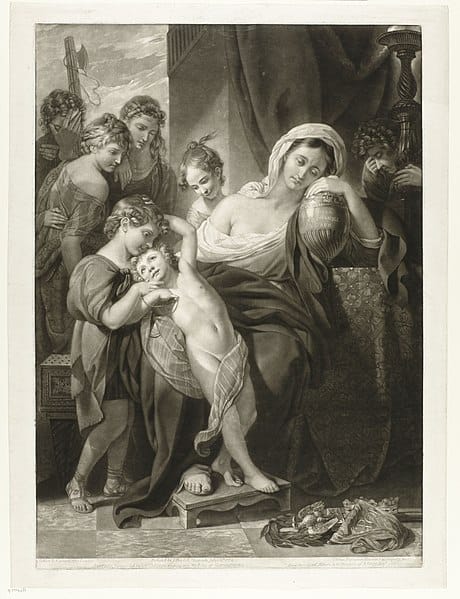Agrippina the Younger was a woman of immense power and influence in ancient Rome. She was known for her ruthless ambition and authoritative nature, which helped her rise to the top of Roman society. Her story is one of political maneuvering, dynastic ambitions, and public image and propaganda.

Early Life
Born in AD 15, Agrippina was the daughter of Germanicus and Agrippina the Elder. Her family background was one of privilege and power, and she was raised with the expectation that she would one day become a powerful figure in Roman society. This early upbringing shaped her character and set her on a path to greatness.
Throughout her life, Agrippina rose to become one of the most influential women in Roman history. She used her political savvy and cunning to maneuver herself and her family into positions of power, and she was not afraid to use any means necessary to achieve her goals. Her legacy is one of strength, determination, and ambition, and her influence can still be felt to this day.
Key Takeaways
- Agrippina the Younger was a powerful and influential woman in ancient Rome, known for her ruthless ambition and authoritative nature.
- She rose to power through political maneuvering and dynastic ambitions, using any means necessary to achieve her goals.
- Her legacy is one of strength, determination, and ambition, and her influence can still be felt today.
Family Background
Her father, Germanicus, was a prominent general, and her mother was the granddaughter of the first Roman Emperor, Augustus. Agrippina the Younger was the sister of the future Emperor Caligula and the mother of the future Emperor Nero. Agrippina’s early life was marked by tragedy, as her father died when she was just three years old. Her mother was then exiled by Emperor Tiberius, leaving Agrippina and her siblings to be raised by their grandmother, Antonia Minor.
Despite these challenges, Agrippina received an excellent education and was known for her intelligence and wit. She also had a strong sense of ambition and a desire for power, which would later shape her actions as an adult. Agrippina’s family background was also significant, as she was descended from some of the most important figures in Roman history. Her great-grandfather was the first Roman Emperor, Augustus, and her grandfather was the famous general Germanicus. This ancestry gave Agrippina the Younger a sense of entitlement and a belief that she was destined for greatness.
Rise to Power
Agrippina the Younger was born into a family of great power and influence in Rome. Her father, Germanicus, was a renowned general, and her mother, Agrippina the Elder, was the granddaughter of Emperor Augustus. Agrippina the Younger’s rise to power began when she married her uncle, Emperor Claudius, in 49 AD. This marriage gave her access to the highest levels of Roman society and allowed her to exert significant influence over the emperor.

Agrippina the Younger used her position as Claudius’ wife to advance her own interests and those of her family. She convinced Claudius to adopt her son, Nero, as his heir, bypassing his own son, Britannicus. This move secured Nero’s position as the next emperor of Rome and ensured that Agrippina would continue to hold power even after Claudius’ death.
Influence Over Nero
After Claudius’ death in 54 AD, Nero became emperor at the age of 16, with Agrippina the Younger serving as his regent. Agrippina was a powerful and influential figure in Nero’s court, and she used her position to further her own ambitions. She was known for her ruthless tactics and her willingness to do whatever was necessary to maintain her hold on power.
Political Maneuvering
Agrippina the Younger was known for her political savvy and ability to form alliances and enmities to further her own ambitions. She was married to Emperor Claudius and used her influence to secure the succession of her son, Nero. She also formed alliances with powerful figures such as Seneca, the philosopher and statesman, and Burrus, the praetorian prefect.
Agrippina was also a shrewd politician, and she used her influence over Nero to advance the interests of her family. She arranged marriages for her children that would strengthen their positions and increase their power within the Roman Empire. She also worked to eliminate her enemies and consolidate her own power, using her connections and influence to manipulate the political landscape in her favor.
However, Agrippina the Younger was not above making enemies. She had a contentious relationship with Claudius’ previous wife, Messalina, and was rumored to have played a role in her downfall. She also clashed with her own son Nero who eventually had her killed.
Role in Roman Politics
Agrippina’s political maneuvering extended beyond her personal relationships. She was actively involved in Roman politics and used her position as empress to influence policy. She was particularly concerned with the welfare of the military and worked to improve their conditions and increase their pay.
Agrippina the Younger also played a role in expanding the Roman Empire. She encouraged Claudius to conquer Britain and accompanied him on his triumphal return to Rome. She was also involved in negotiations with foreign powers, such as the Parthians, and helped secure peace with Armenia.

Source: https://flic.kr/p/xcRCG7
Overall, Agrippina the Younger was a skilled politician who used her intelligence and ambition to shape Roman history. While her methods may have been ruthless at times, her legacy as a powerful and influential woman endures.
Motherhood and Dynastic Ambitions
Her desire for power extended to securing a future for her son, Nero, as the next emperor of Rome. She went to great lengths to ensure that Nero would be the next in line for the throne, even resorting to violence and manipulation. To secure Nero’s position, Agrippina the Younger removed any potential threats to his claim to the throne. She convinced her husband, Emperor Claudius, to adopt Nero as his own son and heir, displacing his biological son, Britannicus. Agrippina also orchestrated the death of Claudius, clearing the way for Nero to take the throne at a young age.
Despite her ruthless tactics, Agrippina was a devoted mother to Nero. She oversaw his education and upbringing, ensuring that he was well-prepared to rule the empire. She also used her influence to secure important political alliances for Nero, further cementing his position as the future emperor.
Future of the Julio-Claudian Dynasty
Agrippina’s dynastic ambitions extended beyond securing Nero’s position as emperor. She also worked to ensure the continued dominance of the Julio-Claudian dynasty. To this end, she arranged marriages between members of her family and other powerful Roman families.
Agrippina’s efforts were largely successful. Nero became emperor at a young age and ruled for over a decade, maintaining the power and influence of the Julio-Claudian dynasty. However, her ruthless tactics and ambitious nature ultimately led to her downfall. Nero eventually turned against his mother, having her killed in 59 AD. Despite her tragic end, Agrippina’s legacy as a powerful and influential woman in Roman history endures. Her efforts to secure the future of her family and the Julio-Claudian dynasty left a lasting impact on the history of Rome.
Public Image and Propaganda
Her public image and propaganda were carefully crafted to portray her as a powerful and virtuous leader. Agrippina’s image was often depicted in art and coinage during her reign. She was portrayed as a strong and commanding figure, often wearing military attire and holding weapons. Her image was also used to promote her family’s dynasty, with inscriptions on coins proclaiming her as the mother of the future emperor Nero.
Agrippina’s public image was also shaped by literary portraits, both during her lifetime and after her death. While some authors portrayed her as a powerful and capable leader, others depicted her as manipulative and ruthless. The historian Tacitus, for example, described her as a woman who “possessed a man’s soul in a woman’s body” and who was “more ambitious than good.”
Despite the mixed portrayals, her propaganda was successful in establishing her as a powerful and influential figure in Roman politics. Her legacy as a strong and capable leader has endured throughout history, even as her reputation as a ruthless and ambitious woman has been debated and reevaluated by scholars.
Exile and Death
Agrippina’s relationship with her son Nero deteriorated over time, and she became increasingly critical of his behavior. She was ultimately exiled to the island of Pandateria in 59 AD, where she was kept under close watch. In 62 AD, Nero ordered Agrippina’s assassination. According to Tacitus, Nero attempted to kill her by sinking a boat she was on, but she swam to safety. He then sent soldiers to kill her in her villa, where she was allegedly stabbed to death. Her death marked the end of the Julio-Claudian dynasty.

Agrippina’s legacy is complex and controversial. While she was undoubtedly a ruthless and ambitious woman, she was also a powerful and authoritative figure in Roman history. Her life and death continue to inspire fascination and debate among scholars and historians.
Modern Perspectives
Modern historians have continued to debate the true nature of Agrippina the Younger. Some have argued that she was a victim of the patriarchal society in which she lived, forced to use her wits and her charm to survive in a world dominated by men. Others have portrayed her as a power-hungry opportunist who was willing to sacrifice anyone and anything to achieve her goals.
One thing is clear: Agrippina the Younger was a woman who made a significant impact on Roman history. Her ambition, intelligence, and ruthlessness allowed her to rise to a position of power that was unprecedented for a woman of her time. Whether she was a hero or a villain, her story continues to fascinate and intrigue historians and laypeople alike.
Impact on Roman Culture
Agrippina the Younger’s legacy had a significant impact on Roman culture. She was a powerful and influential woman who challenged traditional gender roles and norms. Her ambitious and ruthless nature made her a formidable force in Roman politics. During her reign, Agrippina played a crucial role in the appointment of her son, Nero, as the emperor of Rome. She was also responsible for the construction of several public works, including aqueducts, bridges, and public buildings.
Agrippina’s influence on Roman culture extended beyond her political achievements. She was a patron of the arts and supported the work of several poets and writers. Her patronage helped to promote the development of Roman literature and culture.
Reception in Later History
Agrippina’s reputation has been the subject of much debate in later history. While some view her as a powerful and influential figure who challenges traditional gender roles, others see her as a ruthless and manipulative woman who is willing to do whatever it takes to achieve her goals.
Despite the controversy surrounding her legacy, Agrippina’s influence on Roman culture cannot be denied. Her political achievements, patronage of the arts, and construction of public works have left a lasting impact on Roman society.
Today, Agrippina the Younger is remembered as a complex and multifaceted figure who played a significant role in shaping the history of Ancient Rome.
People Also Ask:
What happened to Agrippina the Younger?
Nero ordered the assassination of Agrippina. He made it look as if Agrippina had committed suicide after her plot to kill Nero had been uncovered. Suetonius says that after Agrippina’s death, Nero examined Agrippina’s corpse and discussed her good and bad points.
Why is Agrippina the Younger famous?
Julia Agrippina is best remembered now as the tyrannical mother of the mad emperor Nero or as the overbearing and murderous wife of the emperor Claudius. She is also rarely remembered as the sister of another emperor, Gaius (Caligula).
Did Agrippina the Younger marry her uncle?
Agrippina the Younger was married three times and had one son, Lucius, who later became Emperor Nero of the Roman Empire. Agrippina was the sister of Emperor Caligula and then became empress to the Roman Empire via her marriage to her uncle Claudius.
Did Caligula and Agrippina have a relationship?
The union may not have been the first time Agrippina was involved in an incestuous relationship. She is also rumored to have had sexual relations with Caligula when he served as emperor. Historical sources on Agrippina the Younger include Tacitus, Suetonius, and Dio Cassius.
Who banished Agrippina?
Following the death of his favorite sister, Drusilla, in AD 38, Caligula inexplicably grew vengeful and paranoiac, accusing his two surviving sisters of conspiracy. Agrippina now found herself banished to the Pontine islands, grim rocks in the Tyrrhenian Sea from which few ever returned.
Hello, my name is Vladimir, and I am a part of the Roman-empire writing team.
I am a historian, and history is an integral part of my life.
To be honest, while I was in school, I didn’t like history so how did I end up studying it? Well, for that, I have to thank history-based strategy PC games. Thank you so much, Europa Universalis IV, and thank you, Medieval Total War.
Since games made me fall in love with history, I completed bachelor studies at Filozofski Fakultet Niš, a part of the University of Niš. My bachelor’s thesis was about Julis Caesar. Soon, I completed my master’s studies at the same university.
For years now, I have been working as a teacher in a local elementary school, but my passion for writing isn’t fulfilled, so I decided to pursue that ambition online. There were a few gigs, but most of them were not history-related.
Then I stumbled upon roman-empire.com, and now I am a part of something bigger. No, I am not a part of the ancient Roman Empire but of a creative writing team where I have the freedom to write about whatever I want. Yes, even about Star Wars. Stay tuned for that.
Anyway, I am better at writing about Rome than writing about me. But if you would like to contact me for any reason, you can do it at [email protected]. Except for negative reviews, of course. 😀
Kind regards,
Vladimir
